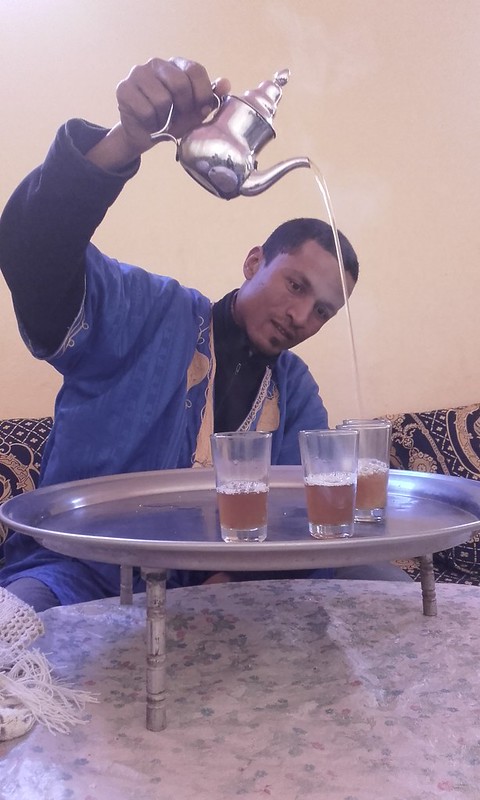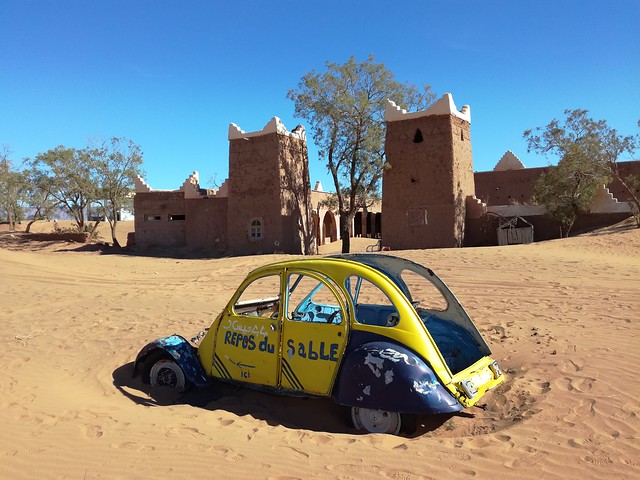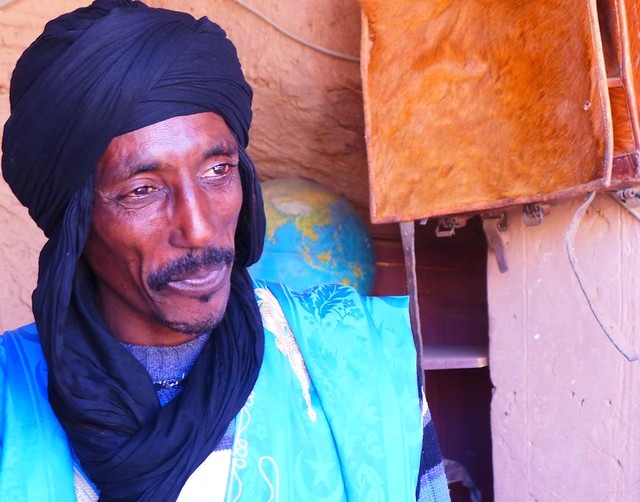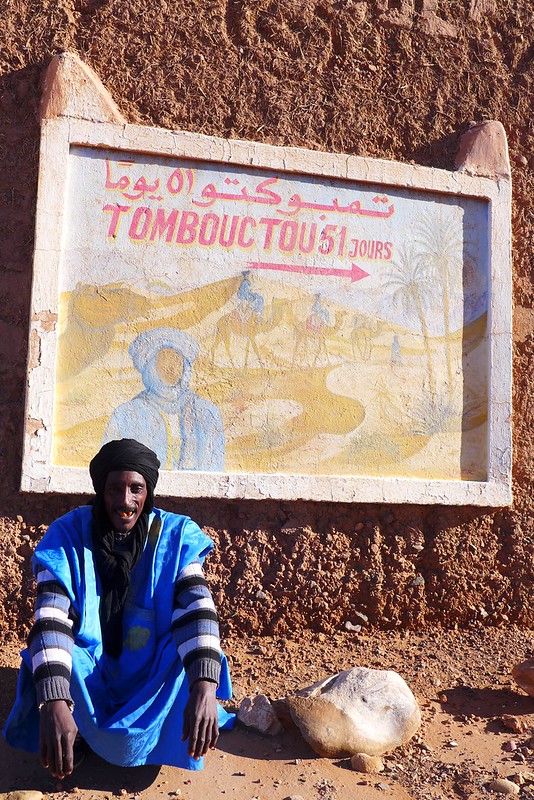Hakim’s story
Hakim had promised to meet us in the car park first thing in the morning, but he is nowhere to be seen, so we seize on the opportunity to find our own way to the library. In fact, it’s only 100m from the van, and we know exactly where it is, but in a town where poverty runs high, as a tourist you will usually find that a guide attaches himself to you, whether you like it our not. They have to live, it’s their only income, and they will insist on guiding you even if your destination is within sight, on the other side of the road.
Tamegroute’s library has indeed an impressive collection of ancient books, but they are kept in inaccessible shelves or dusty display cupboards in a dimly lit room. The librarian seems to be bored of his work, he rattles the facts out in whatever language you’d like, waiting for us to be ready to move onto the next book. I’m not sure he knows exactly what he’s saying though. At the end, he makes the ubiquitous demand for money. Somehow today this is the last straw that breaks the camel’s back. We’d been told that the library was free to visit, and when we came in there was no sign of an entrance fee. He insists they need money to maintain this amazing collection, and of course that makes sense, however, I’m not sure that the money we give him actually reaches its destination.
As we come out of the cold library into the dazzling sunshine, Hakim sits on the front step waiting for us. He apologises for having missed us in the morning. We vent our frustration to him, but soon the conversation turns to a deeper sharing. I want to find out what is the locals’ side of this dynamic. How do they feel about their town being sporadically swamped by tourists? How has the culture of giving changed to a culture of taking? What is our (the tourists’) part in the dynamic of this? What can be changed?
Hakim talks about the different sorts of tourists; those who don’t connect with him and snobbishly look down on him, where he has no qualms taking, and those who he can talk to and may not get any money from. We have a few things to do this morning, photocopying and post office, and he accompanies us. Then we do some work in the van until he collects us for lunch at his house.
The houses and families we have visited along our journey have been very varied. In this house, a very formal atmosphere prevails and I wonder if this has to do with a more strict variety of Islam. The women are quite shy and keep away from us. We are served tea and later food in a room with only Hakim as company. Some curious children poke their heads around the doorway and are sporadically told to back off, only for them to return a few minutes later. The only woman allowed into the room is one of his sisters, a young woman who I think might be slightly mentally handicapped. Maybe as a result of that she has a different status, which makes her not eligible for marriage, hence she doesn’t have to be hidden from strangers, especially men. She is smiley and relaxed. I wish I could communicate with her, but I don’t speak Berber, she doesn’t speak any of the languages I do, and resorting to hand gestures etc. doesn’t really work in this case either.
Hakim, pouring us Berber tea after lunch
We continue our conversation with Hakim. What would he like to do if he were free to choose? Would he choose to be a guide? No, he says, I’d like a regular job with a steady salary that would feed my family. Anything, a chauffeur, work in the field, work in a factory, look after a house, anything. As it is, sometimes I have no work for a month and my family has to eat other peoples’ leftovers.
We walk back from the town to Emma through the dusty bowl of a valley. This used to be a palm grove, with fields. Up there was where the stream came down. There was water, there were crops. We had to go round the outside, you couldn’t just walk here. The water disappeared, so we dug wells to feed the plants, but the ground water is too salty – all of the vegetables and many of the palm trees died. Sand storms came and carried away the earth and deposited sand.
We look around – there are still quite a few palm trees left but you can see where the gaps are, and those that have survived don’t look too healthy. When I grew up, I had something to see and something to look forward to. My children have nothing and they are asking for things which I can’t give them. There is so much despair and resignation in his words. I talk about the children begging from the tourists and that instead of just giving something, we tend to try and make a connection, engage with them. A flash of anger crosses his face when he says, yes, but other tourists give them things and that’s what’s created this situation. I feel for him. It pains him that he can’t provide for his children – them begging and being given stuff from foreigners rubs further salt into the wound, and yet he can’t afford to forbid it. It’s all out of kilter. We leave Tamegroute with heavy hearts, ever more determined to look for ideas that tackle the problems of water shortage.
Posted in Uncategorizedwith comments disabled.
Hotel Repos du Sable
Not far South of Tamegroute, the road passes by a hotel that has seen better days – a skeleton of a 2CV is indeed reposing in the sand – it may never get back out of there!
The hotel itself is a bit lost to the sand; there are little dunes in the courtyard, the swimming pool is full of it and bigger dunes outside snuggle up to the perimeter walls. It looks deserted, but we hear voices. We walk in and find Mohamed, a Touareq, who seems to be squatting there, having installed a little solar panel. Mind you, he still offers bedrooms and they have hopeful names like ‘marriage’ and ‘cinnamon’ and ‘rose’, but they are long past their heydays, with the doors falling off their hinges. It’s kind of quirky though to be in a squatted hotel – I can even imagine that some people actually come and stay here!
Mohamed is a bit evasive about his role here. He tells us that the hotel has been empty for a number of years, following the death of the owner’s wife. He shows us the various rooms and courtyards. Abandoned items lie around; old pots and tagines, decorative items, knicknacks. If you like anything, take it he says, vaguely gesturing across the compound. I’m confused – is he the guardian, does he get paid to look after the place? Not exactly, he says, but won’t be drawn any further on the matter.
A friend of his sits on the terrace, dangling one leg over the side of the wall, playing a one-string guitar. I wish I had some guitar strings on me to give to him, but this year I’ve got my bandoneon with me, not the guitar. Maybe a guitar would have been wiser – my Bandoneon does not like Morocco. By now, two buttons have come loose, the tuning has suffered considerably and the bellows are wheezing a little. The roads are too bumpy and the climate too dry, I guess.
We have quite a lot of food in the van and our Touareq looks pretty thin, so we invite him for lunch. We set out a table by the side of Emma in the sunshine and share a chicken dish with some greens and a carrot and beetroot salad. He says it’s the most he has eaten in a long time.
After lunch, we ask Mohamed if we can take a photo of him against the hand-painted sign directing people to Timbuktu.
He shows us his ID card with his address on, so we can send him the photos when we get a chance to print them. It often happens that people show us their ID cards. It’s one way of giving their address. Sometimes, people are quite open about not being able to write, other times, they will hide it, saying something like they have a pain in their arm and currently can’t write.
Although the desert itself is magnificently silent, the Hotel Repos du Sable is right on the road from Zagora to M’hamid (another famous desert spot), where many vehicles thunder past. We don’t want to stay here for the night, so we head back towards Tamegroute. Suddenly we realise that we’d been in such a rush to leave the touristic atmospheres of Zagora and Tamegroute that we still haven’t refuelled! We notice that our tank is pretty much empty, so we can’t afford to do any extra mileage to find a nice sleeping spot. We pull up outside the library in Tamegroute, ready to defend our space against hawkers. Strangely enough, although there are lots of people about, no-one bothers us. It seems they are 9-5 hasslers!
I take my bandoneon out and practice in the balmy evening air. Frank lights a fire in Emma. The wood we picked up two days ago is indeed smokey – soon a cloud of it is hanging over the car park and drifting towards the village… No one complains though and we have a very lovely night there with no disruption at all!
***************************
For more photos of this chapter, click here
Posted in Uncategorizedwith comments disabled.



